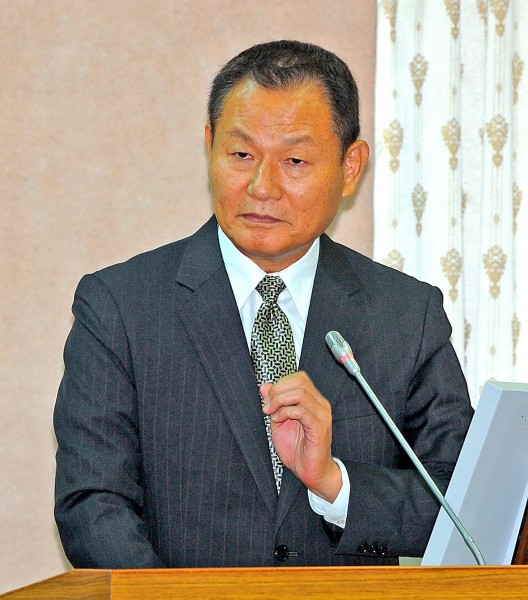《TAIPEI TIMES 焦點》 NSB bans use of Line over questions about security

National Security Bureau Director-General Lee Hsiang-chou yesterday attends a question-and-answer session at the Foreign and National Defense Committee of the Legislative Yuan. Photo: Wang Min-wei, Taipei Times
By Chou Ssu-yu, Alison Hsiao and Jake Chung / Staff reporters, with staff writer
National Security Bureau (NSB) Director General Lee Hsiang-chou (李翔宙) yesterday said his bureau would not use the popular free messaging service Line unless all doubts about its informational security integrity are addressed.
Lee was speaking at a meeting of the legislature’s Foreign and National Defense Committee, along with National Police Agency (NPA) Director-General Wang Cho-chiun (王卓鈞), after comments by Premier Jiang Yi-huah (江宜樺) on Tuesday that the Executive Yuan has instructed civil servants not to use Line to transmit sensitive and confidential information due to security concerns.
Jiang was responding to questions from Chinese Nationalist Party (KMT) Legislator Lai Shyh-bao (賴士葆) about the possible information security dangers of using mobile devices from China’s Xiaomi Corp (小米) and foreign messaging applications.
Lai said it had been revealed that Xiaomi’s operating system collects and transmits personal data to Beijing without permission, and asked whether the government is planning to ban the use of Xiaomi’s devices by its workers to prevent information leaks.
Jiang said the security issues concerning Xiaomi’s products would be looked into by the Ministry of Science and Technology and National Communications Commission, and that whether it would be banned would be evaluated and decided within the next three months.
Line has risks and the bureau will not use the application without resolution of such doubts, Lee said.
The NSB as a whole has not switched over to smartphones, instead using short message services (SMS), Lee added, saying the bureau also encouraged its staff to use the secure devices it provides them.
The bureau would be receiving a new shipment of secured mobile devices, which would aid in keeping sensitive information safe, Lee said.
For his part, Wang said that while his cellphone came with Line installed, he did not use it to discuss official matters.
Wang added that the NPA had earlier in the year told all relevant units that official matters should not be conducted using the application.
Separately at the legislature’s Internal Administration Committee meeting, Democratic Progressive Party Legislator Chiu Yi-ying (邱議瑩) called the Executive Yuan’s measure to ban the use of Line by civil servants at work “a move that follows China’s” because China last month issued new rules banning the app, among other messaging services.
Chiu, when questioning Mainland Affairs Council Minister Wang Yu-chih (王郁琦), said Line has not been reported to be problematic in terms of information security in other countries including the US. Only China has banned it, she said.
“The premier’s announcement of the ban seems to be following China’s,” she said.
According to Executive Yuan spokesperson Sun Lih-chyun (孫立群) on Tuesday, the ban imposed by the Cabinet applies only to government PCs, which should be free of messaging programs such as Line and MSN, two of the most popular services in Taiwan. However, government workers’ personal mobile phones and computers would not be affected by the ban, Sun said.
Asked whether the ban includes WeChat, an app that uses a server in China, Sun yesterday said that no messaging apps are to be downloaded onto government PCs.
“As to government workers’ personal cellphones, we have no such restrictions, but only request their discretion in discussing official information with such apps,” he said.
Wang yesterday said the main consideration for the ban is that the apps use their servers in foreign countries, such as Line’s in South Korea and WeChat’s in China.
新聞來源:TAIPEI TIMES



















